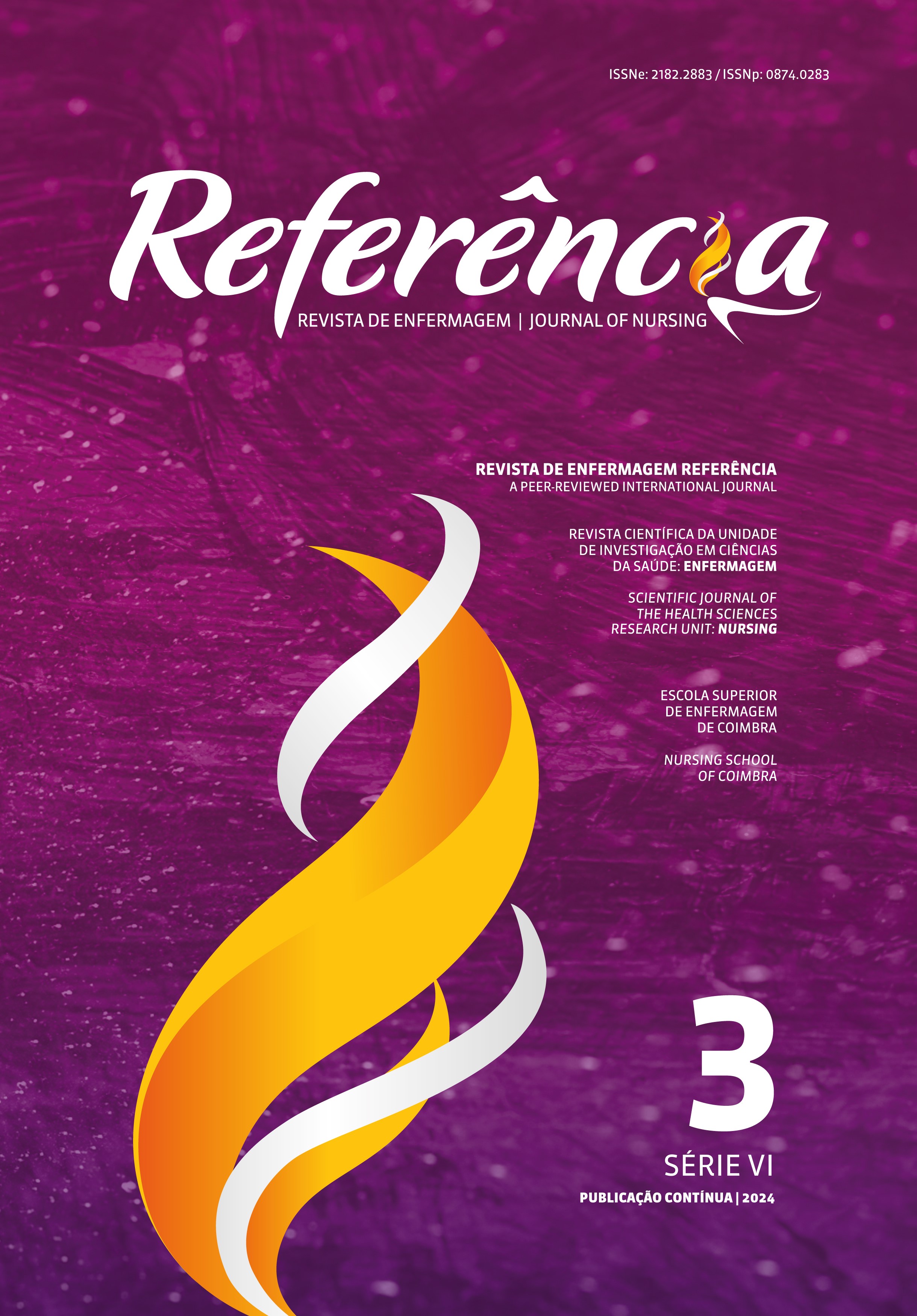Prevalência, incidência e caracterização sociodemográfica e clínica das pessoas com estoma de eliminação em Portugal
DOI:
https://doi.org/10.12707/RVI23.103.32565Palavras-chave:
incidência, monitorização epidemiológica, ostomia, prevalênciaResumo
Enquadramento: Dados que caracterizam as pessoas com estoma em Portugal são escassos. Estabelecer estimativas epidemiológicas pode melhorar o conhecimento sobre esta população e adaptar modelos de cuidados de saúde.
Objetivos: Estimar a prevalência e incidência de pessoas com estoma de eliminação em Portugal em 2021.
Metodologia: Estudo observacional, longitudinal e retrospetivo, a partir de uma base de dados de dispensa de dispositivos para ostomia.
Resultados: Em 2021, o número estimado de pessoas com pelo menos um estoma foi de 22.045. Entre estes, 19.793 [IC95%:19.599;19.994] tinham um estoma de eliminação. Na sua maioria eram homens (61,4%), em média tinham 70,5 anos e residiam preferencialmente na região interior do país. O tipo de estoma de eliminação mais prevalente foi a colostomia (48,8%). A incidência estimada de novos casos foi de 6.622, sendo 5.834 [IC95%:5.680; 5.984] referentes a estomas de eliminação.
Conclusão: Estes resultados permitiram caracterizar o perfil das pessoas com estoma de eliminação em Portugal. Poderão ser úteis para ajustar os programas de prevenção/acompanhamento em saúde desta população e ainda alocar recursos especializados.
Downloads
Referências
Aykan, N. F. (2015). Red meat and colorectal cancer. Oncology Reviews, 9(1), 288. https://doi.org/10.4081/oncol.2015.288
Babakhanlou, R., Larkin, K., Hita, A. G., Stroh, J., & Yeung, S.-C. (2022). Stoma-related complications and emergencies. International Journal of Emergency Medicine, 15, 17. https://doi.org/10.1186/s12245-022-00421-9
Baidoun, F., Elshiwy, K., Elkeraie, Y., Merjaneh, Z., Khoudari, G., Sarmini, M. T., Gad, M., Al-Husseini, M., & Saad, A. (2021). Colorectal cancer epidemiology: Recent trends and impact on outcomes. Current Drug Targets, 22(9), 998–1009. https://www.eurekaselect.com/article/111592
Cabral, A. (2009). Associação Portuguesa de Ostomizados. Jornal Da Secção Regional Do Centro Da Ordem Dos Enfermeiros, 14. https://silo.tips/download/editorial-jornal-da-secao-regionaldo-centro-da-ordem-dos-enfermeiros-setembro-d
Diniz, I. V., Costa, I. K., Nascimento, J. A., Silva, I. P., Mendonça, A. E., & Soares, M. J. G. (2021). Factors associated to quality of life in people with intestinal stomas. Revista da Escola de Enfermagem da USP, 55, e20200377. https://doi.org/10.1590/1980-220X-REEUSP-2020-0377
Direção Geral de Saúde. (2022). Avaliação e monitorização dos rastreios
oncológicos organizados de base populacional 2021. https://www.ffms.pt/sites/default/files/2022-07/i028766.pdf
European Ostomy Association. (2012). Access to ostomy supplies and innovation guiding principles. MedTech Europe. https://www.medtecheurope.org/resource-library/access-to-ostomy-supplies-and-innovation-guiding-principles-for-european-payers/
Hospital Fernando Fonseca. (2020). Hospital Fernando Fonseca assinala o dia mundial do ostomizado. https://hff.min-saude.pt/hospital-fernando-fonseca-assinala-o-dia-mundial-do-ostomizado/
Infarmed. (2021). Relatório do meio ambulatório: Monitorização do consumo de medicamentos. https://www.infarmed.pt/documents/15786/4373142/dezembro/10c6aafe-bdf6-7601-9cf3-9e-190f801531?version=1.0
Instituto Nacional de Estatística. (2021). População residente (n.º) por local de residência, sexo e grupo etário; anual: INE, estimativas anuais da população residente. https://www.ine.pt/xportal/xmain?xpid=INE&xpgid=ine_indicadores&indOcorrCod=0004163xlang=pt&contexto=bd&selTab=tab2
International Agency for Research on Cancer. (2020). Cancer today. http://gco.iarc.fr/today/home
Keum, N., & Giovannucci, E. (2019). Global burden of colorectal cancer: Emerging trends, risk factors and prevention strategies. Nature Reviews Gastroenterology & Hepatology, 16(12). https://doi.org/10.1038/s41575-019-0189-8
National Institute of Diabetes and Digestive and Kidney Diseases. (2020). Urinary diversion. https://www.niddk.nih.gov/health-information/urologic-diseases/urinary-diversion
Neto, M. Á., Fernandes, D. O., & Didoné, E. L. (2016). Epidemiological characterization of ostomized patients attended in referral center from the city of Maceió, Alagoas, Brazil. Journal of Coloproctology, 36(2), 64–68. https://doi.org/10.1016/j.jcol.2014.08.016
Noordzij, M., Dekker, F. W., Zoccali, C., & Jager, K. J. (2010). Measures of disease frequency: Prevalence and incidence. Nephron Clinical Practice, 115(1), c17-c20. https://doi.org/10.1159/000286345
Rawla, P., Sunkara, T., & Barsouk, A. (2019). Epidemiology of colorectal cancer: Incidence, mortality, survival, and risk factors. Przeglad Gastroenterologiczny, 14(2), 89–103. https://doi.org/10.5114/pg.2018.81072
Romão, M., Figueira, D., Galante, H., Guerreiro, J., & Romano, S. (2020). Who are the ostomy patients and caregivers attending Portuguese community pharmacies? A cross-sectional study. BMC Health Services Research, 20(1), 914. https://doi.org/10.1186/s12913-020-05765-7
Schultz, A., Boye, B., Jonsson, O., Thind, P., & Månsson, W. (2015). Urostomy and health-related quality of life in patients with lower urinary tract dysfunction. Scandinavian Journal of Urology, 49(1), 2–7. https://doi.org/10.3109/21681805.2013.876095
Silva, K. A., Duarte, A. X., Cruz, A. R., Araújo, L. B., & Pena, G. G. (2020). Time after ostomy surgery and type of treatment are associated with quality of life changes in colorectal cancer patients with colostomy. PLoS ONE, 15(12), e0239201. https://doi.org/10/gpstx3
Sirimarco, M. T., Moraes, B. H., Oliveira, D. R., Oliveira, A. G., Schlinz, P. A., Sirimarco, M. T., Moraes, B. H., Oliveira, D. R., Oliveira, A. G., & Schlinz, P. A. (2021). Thirty years of the health care service for ostomy patients in Juiz de Fora and surroundings. Revista do Colégio Brasileiro de Cirurgiões, 48, e20202644. https://doi.org/10.1590/0100-6991e-20202644

















